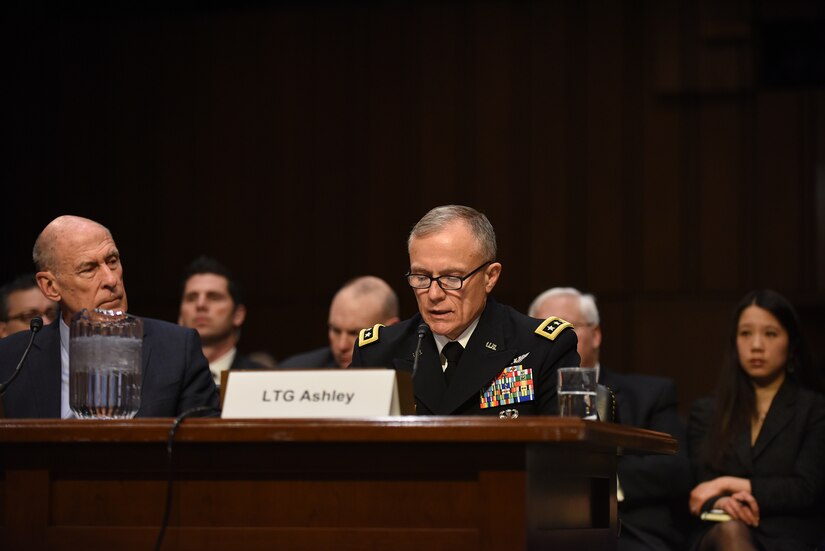By Jim Garamone, DoD News, Defense Media Activity
WASHINGTON -- People told the director of the Defense
Intelligence Agency that in his speech to the Center for Strategic and
International Studies he should just say “Great power competition, artificial
intelligence” and then drop the mic and walk off.
It was a good line, but Army Lt. Gen. Robert P. Ashley Jr.
knows the world is more complex and that even in great power competition among
the United States, China and Russia, context is important.
“We look very closely at the technology development.
Obviously, there’s some breakout things -- we watch the AI side of the house,
the hypersonics, counter-space, [and] what they're doing with regard to subs,
if you're following the maritime piece of that as well,” he said. “They're in
the trials for their first carrier. They got an old one from the Russians; now
they're building their own.”
Ashley said DIA’s mission is to “make sure the secretary of
defense is never surprised,” and that the 16,500 people in DIA work constantly
to ensure Defense Secretary James N. Mattis receives the intelligence he needs,
when he needs it.
The general talked about context, saying it is not enough to
tell leaders what equipment or how many troops a rival military has; they need
to know what foreign leaders are likely to do with those troops and equipment.
“How are they going to fight it?” he said.
For example, the Russians now have a major exercise --
Vostok -- going on in the Far East. They invited China to exercise with them.
“What does that mean? What do U.S. leaders really need to know about Vostok?”
Ashley asked.
“What is it that I can pull out of that that tells our key
leaders, ‘This is the strategy you need think about [in terms of] of how you
counter it,” he said. “So for me, that's the context.”
More Than Simple Military Intelligence
DIA has to be more than simple military intelligence. The
agency needs to analyze the diplomatic, economic and military aspects together,
he said. “It touches strategy,” he said. “It touches what we may see some of
those foreign entities do. It touches acquisition. It touches technology.”
The general put the great power competition with Russia and
China into context during his discussion. “When you think about greater power
of competition, even if you go back to the Cold War time, … any place that
Russia could change an alignment, change a relationship, align it to Russia,
that would be something they would do to their favor,” he said. “They would
want to do that.”
The same applies today, he said. Russia will do what it can
to get a foothold in a nation and develop a relationship separating it from the
United States and its allies. The other part of being a great power for Russian
President Vladimir Putin is that he sits at the table with other great powers,
Ashley said. “And so, that’s part of the intent behind what he wants to
accomplish,” the general said.
Putin wants to be a player, Ashley said, and that is why
Russia injects itself into Syria, Libya, the greater Middle East and even in
central Asia. “[Putin] gets himself to the table in some way, shape, or form …
to make a decision,” Ashley said.
China’s Economic Might
China is different, he said, in that the Chinese have the
economic might to truly be a great power, noting that have watched the U.S.
military closely since 1991’s Operation Desert Storm and were amazed at what
the American military has done since 9/11.
“They've watched us over the course of the last couple of
decades as they have grown capability,” Ashley said. “And in many ways, they've
mirrored some of the things we've done.” The Chinese are trying to develop
joint capabilities, he added, and have built a number of national training
centers.
It is tough to ascertain what the Chinese see as the end
state, the general said. They could be intent on putting in place a strategy
for global hegemony over a period of 100 years, or it could simply be about
taking care of the Chinese people.
Still, the general said, there are disturbing trends.
Building islands is one thing, he said, but placing defenses and missiles on
those islands in the South China Sea is destabilizing. “This we watch closely
-- obviously, as we do on behalf of the nation,” Ashley said. “But it's not a
foregone conclusion that this is going to be a competitor that turns to an
enemy.”
He also watches the growing Chinese economic influence in
Djibouti, Sri Lanka and Pakistan. “What takes place over time? Does that lease
become a constant visit of a naval presence? Does that naval presence turn into
a base? Does that base turn into yet a presence again, mirroring very much what
the U.S. is able to do from a global standpoint?” he said.
The debate about China, he said, is whether it is a regional
hegemon looking after Chinese interests, or is pursuing interests that are more
global in nature.









No comments:
Post a Comment